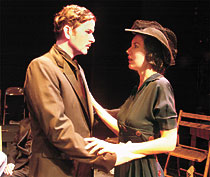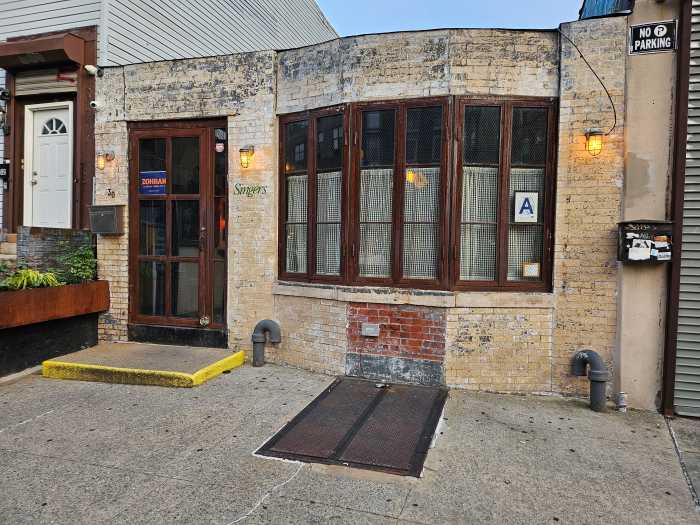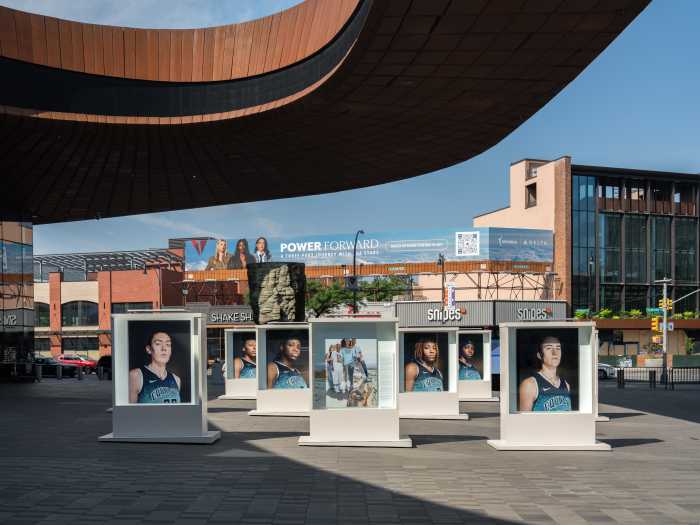It takes chutzpah for a small theatrical
company to revive Arthur Miller’s 1980 play, "The American
Clock," as The Sackett Group is doing at Fort Greene’s Brooklyn
Music School Playhouse through Sunday. A large-cast, historical
pageant about the Great Depression, that’s also a thinly veiled
memoir of the late dramatist’s coming-of-age, this minor work
is as stylistically erratic as it is conceptually ambitious.
At first, the show comes across as being an agit-prop revue:
there’s the occasional insertion of period songs, a couple of
dance numbers, and some representative vignettes peopled by largely
forgotten real-life figures like Jesse Livermore (the man some
held accountable for the stock market crash of 1929) and Billy
Durant (the one-time general manager of Buick).
But in the second act, Miller switches over to a fairly conventional
structure by extracting a single narrative thread from his crazy
quilt structure then forcing it to serve as the clothesline from
which he’ll hang his main ideas.
Given the playwright’s standing as one of the 20th century’s
great social realists, there’s a certain fascination that comes
with seeing him in such an experimental mode. The themes – the
mercilessness of capitalism; the quiet dignity of the common
man – are what you’d expect from the man behind "Death of
a Salesman," but he’s also pushing himself (and the audience)
in unexpected directions, too.
At times, like one scene in which a failed dentist tells a prostitute
about his fear of drilling, the humor is sly and broad; other
times, he’s scripted external commentary that echoes the choral
speeches of Greek tragedy.
Yet if "The American Clock" reveals Miller at his most
adventurous, it also finds him at his most stridently didactic
and his least structurally coherent. Many monologues, short on
character and long on moralizing, are undisguised sermons preaching
a message of moral outrage: a Harlem- widow-turned-Communist-organizer
proclaims the importance of getting mean when the system treats
you inhumanely; the former General Electric executive, Theodore
K. Quinn, denounces big business as the antithesis of the American
Dream. When the semi-autobiographical Baum family’s hard-luck
story of upper-middle class privilege destroyed by Black Tuesday
eventually emerges as the through-line feels more like default
than grand design.
That sort of throwing up your hands and going with what’s familiar
unfortunately informs the Sackett Group’s production as well.
The current show, the troupe’s third as resident company at the
Brooklyn Music School, doesn’t follow Miller’s brash if bumbling
first act homage to the music hall nor attacks his manifesto-like
speeches with the gusto they require. Instead, director Robert
Weinstein and his cohorts impose a realistic acting style nearly
throughout that makes the bolder sections seem fragmented and
small and the kitchen sink moments somewhat isolated and overstated.
A marathon dance contest drifts on, then evaporates into nowhere;
a speech about one man’s life after jail is presented like an
actor’s audition; an encounter between a journalist and a night
watchman feels contrived.
The root of the problem may be simply that Weinstein has come
at the material a little too reverentially. A misapplied form
of respect informs the production with austerity overhanging
the entire proceedings.
Set designer John Scheffler has left the stage nearly bare: a
few raised platforms, a hideous prop piano, wooden folding chairs
on which the actors sit to observe the action when not performing
it. Dallas Williams’s costumes are somber: predominantly black
dresses, black shirts, and black pants that make the men especially
resemble stagehands, not members from a bygone era. Even the
tinny sound system – which pipes in Bessie Smith and an incongruous
Ella Fitzgerald – has a limited range of color.
A few actors in this monochromania make it work in supporting
roles: Dawn Marie Hale looks as though she’d step right out of
a sepia-toned Dorothea Lange photo; Lillian Small could do screwball
comedies with Paul Falcetta as her mustachioed straight man.
(All of these performers are woefully underused and under-directed;
others, playing up to five different parts, are unnecessarily
overburdened in a cast of 18.)
As to the leads, David Sochet, as Miller’s stand-in, has misguidedly
confused unflagging earnestness for Miller’s signature eternal
truth-seeking. Like the larger production, he works too hard
to be taken seriously when at times, he – and everyone else for
that matter – could have just been having fun.
You can understand why Weinstein chose to direct "The American
Clock." Miller is easily one of the borough’s most respected
native writers. A successful mounting of this problematic play
would have been quite a coup for his company. Furthermore, the
parallels between the aftermath of Hurricane Katrina and the
Depression proved prescient timing. If only "The American
Clock" hadn’t come unwound!
The Sackett Group’s production of "The
American Clock" runs Thursday through Saturday at 8 pm,
and Sunday at 4 pm through Feb. 19 at the Brooklyn Music School
Playhouse (126 St. Felix St. between Lafayette Avenue and Hanson
Place in Fort Greene). Tickets are $19. For reservations, call
(718) 638-7104 or e-mail sackettgroup@verizon.net.

























